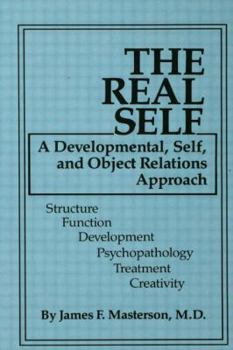The Real Self: A Developmental, Self and Object Relations Approach
Select Format
Select Condition 
Book Overview
First Published in 1985. This informative volume examines the clinical research linking nor-mal separation-individuation with object relations theory and devel-opmental psychopathology. It focuses on the core problem-the lack of a concept of the self-integrated with object relations theory. By adding a theory of the self to object relations theory, the book both enlarges and more acutely focuses the therapeutic perspective, thereby enhancing work with patients. It also further enables therapists to clarify their own real selves. Dr. Masterson's thesis is that, for the real self to finally emerge from the symbiotic union and assume its full capacities, identification, acknowledgment, and support are required from the mother and father in early development and from the therapist in psychotherapy. Dr. Masterson describes and illustrates the therapeutic technique of communicative matching and provides the necessary acknowledg-ment while maintaining therapeutic neutrality. Part I reviews psychoanalytic theory of the ego and the emerging real self; its structure, function, development, and its psychopathol-ogy and treatment. Part II explores the relationship between maternal libidinal ac-knowledgment and the development of the real self by a cross-cultural comparison of child raising in Japan, Israel, and the United States. It then describes the influence of social and cultural factors on the functioning of the real self in the United States. Part III on Creativity and the Real Self draws upon fairy tales, Jean Paul Sartre, Edvard Munch, and the life and work of the novelist Thomas Wolfe to show how for some artists creativity becomes a crucial vehicle in their search to establish a real self. This section illuminates the nature of personal and artistic creativity and describes how a professional interest in the functioning of the real self leads inevitably to an interest in the ultimate of self-expression-creativity. Of special interest are the numerous case illustrations drawn from Masterson's extensive clinical work showing how acknowledgment and support enable the real self to fully emerge from the symbiotic union and to assume its full capacities.)
Format:Hardcover
Language:English
ISBN:0876304005
ISBN13:9780876304006
Release Date:March 1985
Publisher:Routledge
Length:192 Pages
Weight:0.98 lbs.
Dimensions:0.9" x 6.2" x 9.3"
Customer Reviews
3 ratings
Now THESE are Pearls, Fritz!
Published by Thriftbooks.com User , 17 years ago
Masterson has published a master work for anyone helping those with weak or damaged selves, or poor ego functions, or however one might describe the underdeveloped soul. He presents a detailed review of the history and the confusion surrounding the concept of self and proceeds to define it - reaching beyond Erikson, beyond Winnicott and even the "Self Psychologists." He focuses on the effects of rupture and disruption during a particular phase of separation-individuation and uses a form of "mirroring" as a technique to move patients beyond symptom improvement towards a path of self-directed self-actualization, not that Masterson would necessarily put it that way, but these point towards the way he defines, describes, derives interventions, presents cases and outcomes, as well as how-to's and cautionary counterindications for the professional helping to develop the selves of adults. For psychotherapists and patients treading this jagged path, Masterson's master stroke - The Real Self - doesn't change the path, but provides a reliable walking stick to help with the steep climbs, the treacherous descents, and those times of unanticipated loss of balance. Even for the non-professional, if you ever had a self, want to have one, or knew someone who did, or didn't, have a self, this book will prove provocative, even if you skip those few parts that may seem too technical. Give it a try. What have you got to gain?
The real self: A devlopmental,self and object realtions approach
Published by Thriftbooks.com User , 19 years ago
The book was sent when the seller said
Neat. But You Should Probably Save Your Money
Published by Thriftbooks.com User , 19 years ago
My lengthy review for Masterson's mainstream doppleganger version of this book, The Search for the Real Self, applies equally well to this version; you really only need to read one, and which you read is entirely up to what you want to get out of it. People who complained of the academic tone of the other book should steer very much clear of this one (which shouldn't be hard, considering the price) Parts of The Search for the Real Self are actually re-edited and reconfigured versions of long passages from this one, and much of the content in that book is in fact phrased more concisely and accessibly, so unless you're seeking this out for more academically motivated reasons, I definitely have to recommend you go for the other book. On the other hand, this book does a much better job of conveying Masterson's actual theory and the nuance of his therapeutic approach, which is why I've given it a higher score. If his concept of a "real self" as gleaned from The Search for the Real Self leaves your postmodern noggin skeptical, give this one a harder look -- there's nuance described here lacking in the other that is really rather interesting. All the problems mentioned in my other review still hold for this one, but there's considerably less culturally-loaded hand-holding to wade through before one can deal with the actual mechanisms in question. On more thing worth mentioning -- there's a chapter on Japan in this one that I don't believe Masterson has published anywhere else, and though it's embarrassingly ethnocentric and naive from any sort of serious anthropological perspective, you might find the scope and peculiarity of its interpretation to be quite interesting.






